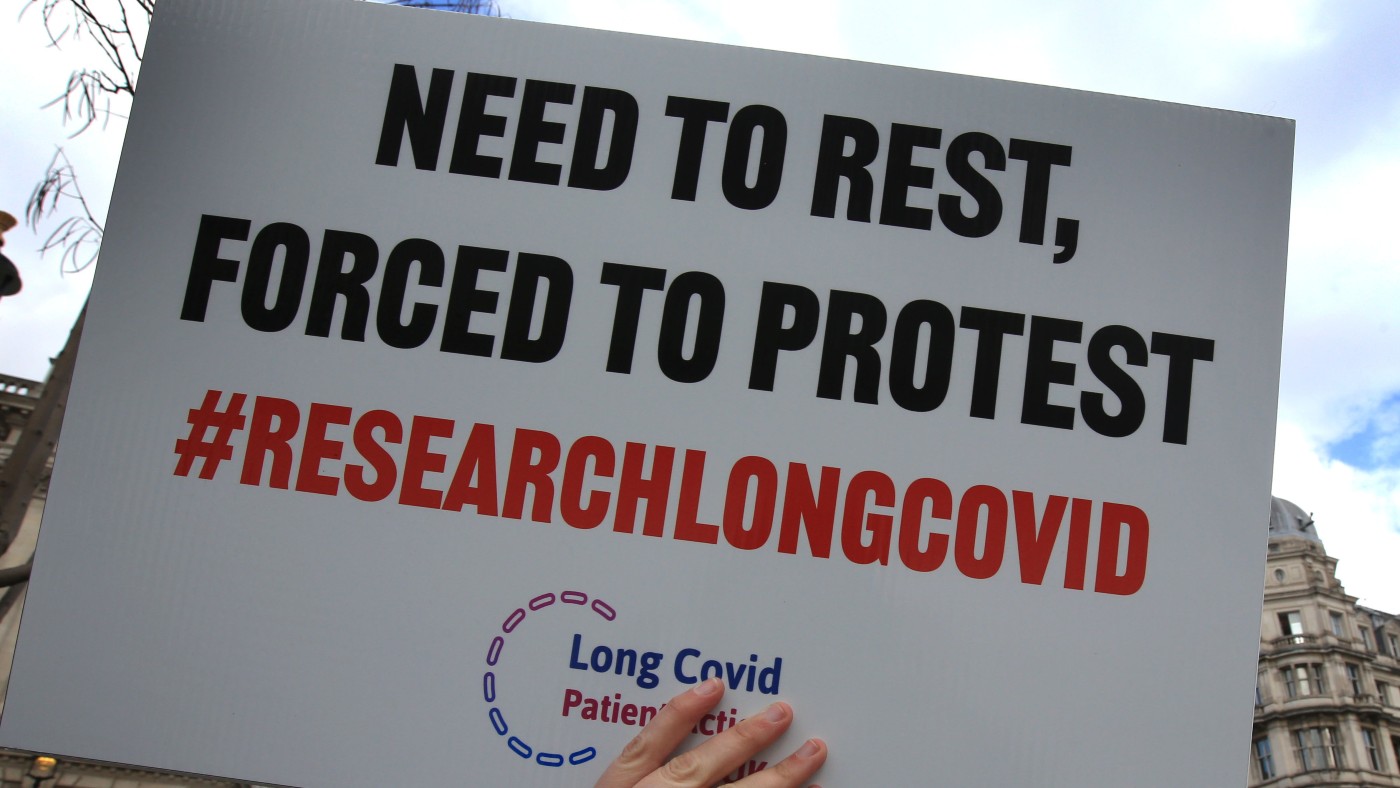Thousands of people in UK out of work due to long Covid
New data suggests 0.5% of total economic inactivity in working-age population of non-students due to long Covid

A free daily email with the biggest news stories of the day – and the best features from TheWeek.com
You are now subscribed
Your newsletter sign-up was successful
Nisreen Alwan, professor of public health at the University of Southampton and Daniel Ayoubkhani, principal statistician at the Office for National Statistics and the University of Leicester explain how the latest statistics on the Covid pandemic and jobs suggest long Covid could be causing high levels of economic inactivity.
Almost 2 million people in the UK are estimated to be living with long Covid – after-effects of COVID that can persist for months or even years after the initial infection.
Common symptoms include fatigue, breathlessness, muscle and joint pain, cognitive impairment and sleep disruption. People with long Covid also have a higher risk of developing serious heart and lung problems, stroke and blood clots compared to those who have not previously been diagnosed with Covid.
The Week
Escape your echo chamber. Get the facts behind the news, plus analysis from multiple perspectives.

Sign up for The Week's Free Newsletters
From our morning news briefing to a weekly Good News Newsletter, get the best of The Week delivered directly to your inbox.
From our morning news briefing to a weekly Good News Newsletter, get the best of The Week delivered directly to your inbox.
Studies from multiple countries have found that long Covid is linked to an increased likelihood of not working. For example, US research found long Covid was associated with 23% higher odds of being unemployed and 16% lower odds of working full-time (25% for those with cognitive symptoms).
We analysed data from the Office for National Statistics (ONS) to assess the situation in the UK, and similarly found long Covid to be strongly associated with being out of work.
Economic inactivity and long-term absence
Our analysis, published by the ONS, considers data collected from 206,000 respondents to the coronavirus infection survey. This survey was conducted by the ONS and included questions on long Covid from February 2021 until March 2023, comprising a large, randomly selected sample of UK households.
We aimed to explore the relationship between long Covid and being out of employment while not looking for work (economic inactivity), or long-term absence while in employment.
A free daily email with the biggest news stories of the day – and the best features from TheWeek.com
Importantly, the coronavirus infection survey data provided access to monthly measurements taken from the same people. This allowed us to evaluate labour market status both before and after Covid infection, rather than making comparisons between different people at one point in time.
The people in our sample were working-age adults, excluding anyone in full-time education. For those reporting long COVID seven to 12 months after an initial Covid infection, the odds of being out of employment and not looking for work (excluding due to retirement) were roughly 40% higher compared with the period before having Covid.
This relationship was strongest for people aged 50 to 64, where higher odds of inactivity compared with pre-infection peaked at a 71% increase among those reporting long Covid seven to nine months post-infection.
We also saw that among people in employment, those reporting long COVID four to seven months after first having COVID were over 40% more likely to be absent from work for at least four weeks compared with pre-infection.
However, this increased likelihood didn’t persist for people still reporting long Covid beyond seven months after an infection. This may reflect people returning to work (with or without persistent symptoms) upon completing the 28-week statutory sick pay period.
It might also suggest participants with the most severe illness had already left employment by seven months after an infection, and therefore were no longer in our sample.
Putting these findings into context
Economic inactivity rates in the UK have risen during the pandemic. Half a million more working-age adults were out of employment primarily due to ill health in mid-2022 compared with 2019.
Based on prevalence estimates of long Covid, considered with the calculations we set out above and excluding retirement, we estimate the number of working-age, non-students in the UK who were inactive because of long Covid symptoms was 27,000 in July 2022.
This represents 0.5% of total economic inactivity in the working-age population of non-students during the same period.
It’s worth noting that our analysis probably doesn’t reflect the full range of employment-related consequences of long COVID. For example, we were unable to assess the effect on working hours due to lack of data.
But research by the Institute for Fiscal Studies suggested that long Covid may have resulted in the loss of 4.4 million working hours per week in the UK.
Another analysis incorporating data from the understanding society study estimated that cumulatively, 80,000 people in the UK had left employment due to long Covid by March 2022.
It’s also possible that the working capacity of family members of people with long Covid is affected. For example, they might need to reduce their working hours to provide care and support for loved ones, but there’s limited research on this at present.
What could help?
Long Covid symptoms are often fluctuating or episodic, making it tricky to recognise recovery, which can be confused with remission (disappearance of symptoms for a length of time). This is likely to make return to a fixed pattern of work difficult, particularly in the absence of job flexibility.
It’s important to consider the potential widening of health, social and economic inequalities in society because of this, as often the higher paid jobs are more flexible in terms of hours and location of work.
In a recent survey of more than 3,000 people with long Covid, two-thirds of those who chose to take part reported having experienced unfair treatment at work. Almost one-quarter of respondents said their employer had questioned whether they have long COVID or the effect of their symptoms.
The all-party parliamentary group for coronavirus in the UK has recommended that the UK government should recognise long COVID as an occupational disease for all key workers. They have also urged the UK government to produce guidelines for employers in both private and public sectors to help employees manage the effects of long Covid.
For the sake of public health and productivity, supporting people with long Covid and other episodic chronic illnesses to navigate job arrangements should be a priority for governments, employers and wider society. Negative attitudes towards long Covid at work can reinforce the high levels of stigma we know people with the condition experience.
Nisreen Alwan, Professor of Public Health, University of Southampton and Daniel Ayoubkhani, Principal statistician, ONS and PhD Candidate, University of Leicester
This article is republished from The Conversation under a Creative Commons license. Read the original article.
-
 Democrats seek calm and counterprogramming ahead of SOTU
Democrats seek calm and counterprogramming ahead of SOTUIN THE SPOTLIGHT How does the party out of power plan to mark the president’s first State of the Union speech of his second term? It’s still figuring that out.
-
 Climate change is creating more dangerous avalanches
Climate change is creating more dangerous avalanchesThe Explainer Several major ones have recently occurred
-
 What’s TrumpRx and who is it for?
What’s TrumpRx and who is it for?The Explainer The new drug-pricing site is designed to help uninsured Americans
-
 A Nipah virus outbreak in India has brought back Covid-era surveillance
A Nipah virus outbreak in India has brought back Covid-era surveillanceUnder the radar The disease can spread through animals and humans
-
 Covid-19 mRNA vaccines could help fight cancer
Covid-19 mRNA vaccines could help fight cancerUnder the radar They boost the immune system
-
 The new Stratus Covid strain – and why it’s on the rise
The new Stratus Covid strain – and why it’s on the riseThe Explainer ‘No evidence’ new variant is more dangerous or that vaccines won’t work against it, say UK health experts
-
 RFK Jr. vaccine panel advises restricting MMRV shot
RFK Jr. vaccine panel advises restricting MMRV shotSpeed Read The committee voted to restrict access to a childhood vaccine against chickenpox
-
 RFK Jr. scraps Covid shots for pregnant women, kids
RFK Jr. scraps Covid shots for pregnant women, kidsSpeed Read The Health Secretary announced a policy change without informing CDC officials
-
 New FDA chiefs limit Covid-19 shots to elderly, sick
New FDA chiefs limit Covid-19 shots to elderly, sickspeed read The FDA set stricter approval standards for booster shots
-
 RFK Jr.: A new plan for sabotaging vaccines
RFK Jr.: A new plan for sabotaging vaccinesFeature The Health Secretary announced changes to vaccine testing and asks Americans to 'do your own research'
-
 Five years on: How Covid changed everything
Five years on: How Covid changed everythingFeature We seem to have collectively forgotten Covid’s horrors, but they have completely reshaped politics